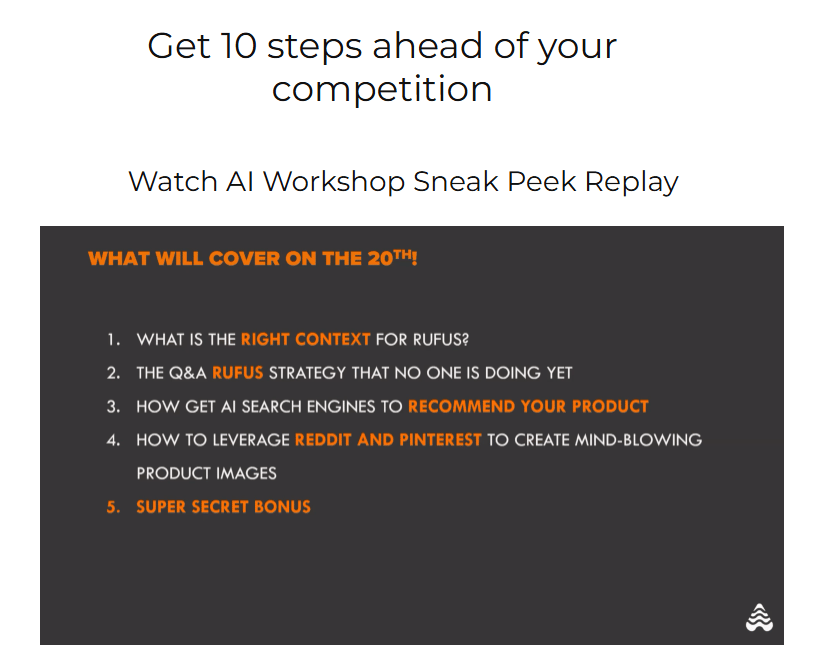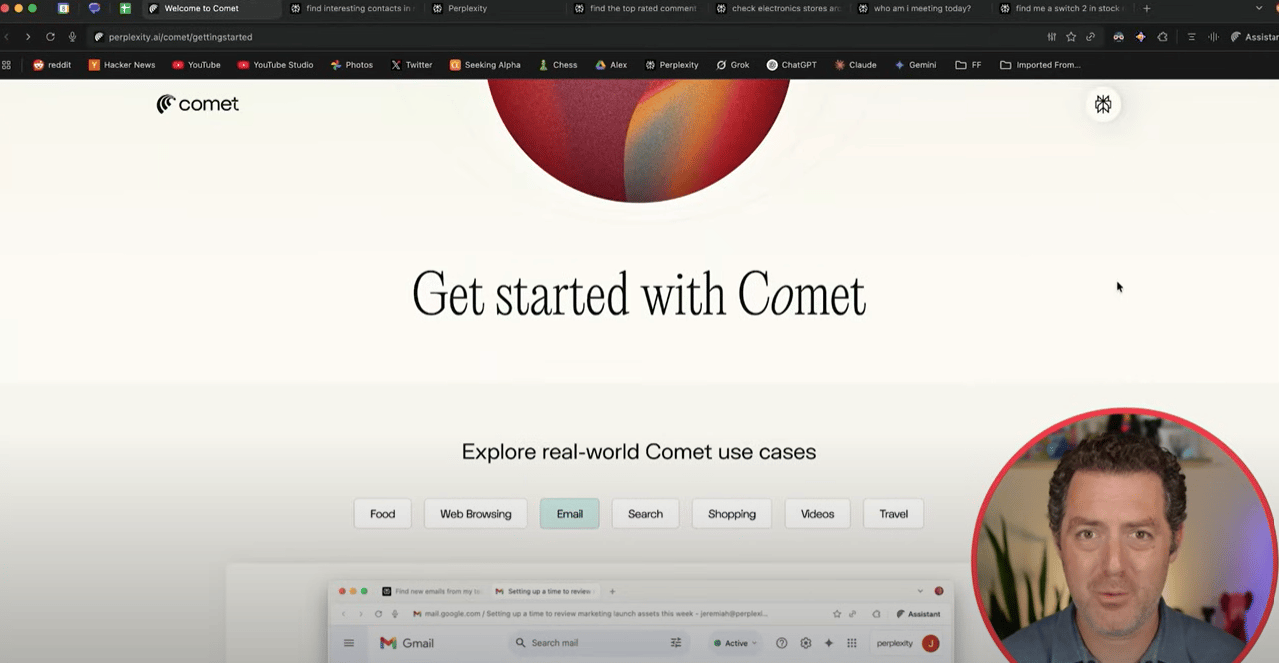- AI for Ecommerce and Amazon Sellers
- Posts
- OpenAI Just Decided to Eat Everyone's Lunch (And Your Checkout Page Too)
OpenAI Just Decided to Eat Everyone's Lunch (And Your Checkout Page Too)
Plus new from Google & Perplexity

From Our Sponsor:
The 2-out-of-3 seller death sentence is here ...
Something big happened last Thursday, and you can still watch it.
8 AI experts gathered on one webinar.
What they revealed will shock you.
Kevin King opened with a bone-chilling prediction: Only 1 in 3 Amazon sellers will survive what's coming.
The AI apocalypse.
And it's already started.
This Ai Apocalypse Webinar replay expires Saturday.
It’s a sneak peek into the AI for Ecom Workshop coming on July 20.
After that, this intelligence disappears forever.
The 2-hour recording reveals exactly what the 1-in-3 survivors will be doing differently.
TL;DR: OpenAI's Commerce Checkmate
OpenAI is building a checkout system directly into ChatGPT that would let users complete purchases without ever leaving the platform, with merchants paying OpenAI a commission on each sale. This isn't just another feature—it's a direct challenge to Google's $200+ billion search advertising business and Amazon's marketplace dominance. When people can buy products through AI conversations instead of clicking through search results or browsing product pages, the entire foundation of online commerce shifts from link-based discovery to conversation-based transactions.
OpenAI Just Decided to Eat Everyone's Lunch (And Your Checkout Page Too)
Okay, we need to talk about how OpenAI is basically trying to become the Amazon of everything. I've been diving deep into this story, and it's got me completely rethinking our entire approach to online selling.
Here's the deal: OpenAI is now actively building a checkout system directly into ChatGPT. Not just "hey, here's a link to buy this thing," but full-on "add to cart, enter your payment info, boom, you're done" without ever leaving the chat. And they're taking a cut of every sale.
Which... wow. That's essentially saying "we're not just going to help people find products, we're going to sell them too." It's like your friendly neighborhood librarian suddenly opening a bookstore in the library. Bold move, Sam Altman.
The "Holy Grail" of AI Monetization
Here's why this OpenAI commerce move has me completely riveted: it's the textbook example of how to pivot from "cool technology that burns money" to "actual business that prints money."
OpenAI is valued at $300 billion but still losing money. Their current model depends on people paying $20/month for premium features, which is... well, it's a tough sell when the free version is pretty amazing. But taking a commission on actual purchases? That's real money tied to real transactions.
According to multiple people familiar with the proposals, OpenAI now aims to integrate a checkout system into ChatGPT, ensuring users complete transactions within the platform. Merchants that receive and fulfill orders this way will pay a commission to OpenAI. This builds on their existing Shopify integration announced back in April, but takes it to the next level by eliminating the need to leave ChatGPT entirely.
How Shopping Just Got Flipped Upside Down
Think about how most people shop online right now. They start with a Google search or go straight to Amazon, browse through options, read reviews, maybe check a few different sites for prices, and then complete their purchase. If you're one of the growing number of people using ChatGPT for shopping recommendations, you've probably experienced the friction of getting suggestions and then having to click through to external sites to actually buy anything—often abandoning those carts because switching contexts is annoying.
The new system would eliminate all that friction. You'd literally go from "I need a waterproof backpack that can hold my laptop" to "thanks for your purchase, it'll arrive Thursday" without ever leaving the chat. No new tabs, no remembering passwords, no second-guessing yourself while staring at a different website.
For those of us selling products, this is simultaneously terrifying and potentially amazing. On one hand, higher conversion rates because there's zero friction. On the other hand, another platform taking a cut of our sales.
Google's $200 Billion Problem
Here's something that's been nagging at me: Google's entire business depends on people clicking on ads to get to product pages. When you can buy things directly through AI chat, what happens to those clicks?
This isn't just about losing some traffic—it's about the complete collapse of the Pay-Per-Click model. Why would anyone pay for search ads when customers never actually search anymore? They just tell an AI what they want and buy it immediately.
I've been talking to some agency folks (the ones who aren't having existential crises), and they're doubling down on what we've been discussing in previous issues: AIO (Artificial Intelligence Optimization). Remember, this is the practice of optimizing content to get your products recommended by AI systems instead of ranking in search results—and it's becoming more critical by the day.
The problem? Nobody really knows how it works. At least with Google, you could reverse-engineer the algorithm. With AI recommendations, it's basically a black box. Fun times.
Amazon's Marketplace Monopoly Just Got Complicated
Amazon's dominance comes from being where people start their product searches. When you think "I need something," you probably open Amazon first. That's worth billions in commission revenue.
But what happens when people start their shopping journey in ChatGPT instead? Suddenly, that AI could recommend products from Shopify stores, direct-to-consumer brands, or smaller retailers that normally can't compete with Amazon's visibility.
This is actually huge for those of us running our own stores. Instead of fighting Amazon's algorithm and paying their 15% fees, we could potentially reach customers through AI platforms that evaluate products based on actual quality and relevance rather than who pays the most for placement.
Though let's be real—OpenAI will probably want their cut too. The question is whether their commission structure will be more favorable than Amazon's, and whether the conversion rates will be high enough to justify another platform taking a slice.
The Reality Check: We're Not All Shopping Through AI Tomorrow
Before we get carried away imagining a world where everyone buys everything through chat, let's pump the brakes for a second. This transformation isn't happening overnight, and adoption will be wildly uneven across different demographics.
My 70-year-old neighbor still prints out driving directions from MapQuest. My Gen Z nephew hasn't opened a web browser in months—everything happens through apps on his phone. The idea that we'll all suddenly start buying laptops and groceries through AI conversations is... optimistic.
The reality is that most people will stick with familiar purchasing patterns for years to come. Amazon's one-click ordering, traditional e-commerce sites, and even (gasp) physical stores aren't disappearing anytime soon. Early adopters will experiment with AI commerce, but mass adoption typically takes 5-10 years for major behavioral shifts like this.
This means we have time to adapt gradually rather than panic-pivoting our entire strategy. The smart play is probably treating AI commerce as an additional channel rather than a replacement for everything we're already doing well.
What This Actually Means for Our Businesses
As someone who's spent years navigating platform changes (remember when Facebook organic reach died overnight?), I'm looking at this through the lens of: how do we adapt before everyone else figures it out?
Here's what's got my full attention right now:
Platform Diversification: We're about to have another major platform to manage. Just when you thought you had Amazon, Shopify, social media, and email marketing figured out, here comes AI commerce. The businesses that move fastest on this will probably have a significant advantage.
Product Data Optimization: Our product descriptions need to work for AI systems, not just human browsers. That means detailed attributes, use cases, and comparative advantages written in natural language that AI can understand and relay accurately.
Customer Relationship Control: When people buy through AI platforms, do we still own the customer relationship? Can we follow up with them directly? These details matter enormously for lifetime value calculations.
The Bottom Line for Sellers
OpenAI's commerce integration represents a fundamental shift in how people will discover and buy products online. While the timeline is still unclear, the direction seems inevitable—AI is becoming the new storefront.
Rather than waiting to see how this plays out, we should start preparing now. The sellers who understand AI commerce early will likely have significant advantages as this technology becomes mainstream.
The robots might be getting better at selling things, but they still need great products to recommend. That's where we come in. The key is making sure they can find us when customers ask.
Do You Love The AI For Ecommerce Sellers Newsletter?
You can help us!
Spread the word to your colleagues or friends who you think would benefit from our weekly insights 🙂 Simply forward this issue.
In addition, we are open to sponsorships. We have more than 35,000 subscribers with 75% of our readers based in the US. To get our rate card and more info, email us at [email protected]
The Quick Read:
Google’s AI Overviews are reshaping SEO, slashing click-through rates and demanding a rethink of content strategy. Should you chase visibility or pivot to deeper intent?
Grok 4 just took the crown, outperforming GPT-4, Gemini 2.5 and Claude 4 across all major AI benchmarks. Elon’s xAI has officially entered the chat.
Circle to Search just leveled up, blending AI Mode’s reasoning directly into 300M+ Android devices for seamless, multimodal exploration. Gaming tips and visual queries just got smarter.
Times have changed, and although people still say please and thank you, the treatment has most certainly changed!
Amazon may pour more billions into Anthropic, deepening a strategic alliance that positions Claude as its AI flagship while challenging Google’s Gemini and Microsoft’s OpenAI dominance across cloud, chips, and enterprise AI adoption.
SEO is out, GEO is in. Generative Engine Optimization is the new battleground for search visibility and ignoring it could cost you your audience.
Google’s AI Overviews are pushing shady product picks, sourcing salesy fluff from manufacturer blurbs and hallucinating reviews. Marketers beware.
UX is drowning in data, and creativity is paying the price. Designers stuck in A/B loops risk losing the human touch that makes great products.
Brands are building fan clubs on Substack, swapping sterile marketing emails for founder-led stories, insider content, and long-form vibes Gen Z can’t resist.
Instagram goes open web, letting Google index public pro accounts. Hello cross-platform visibility, goodbye app-only discovery.
Perplexity’s AI-first browser lets you task agents to navigate the web for you, work across tabs, and take action on real sites locally, signaling a future where you don’t browse websites, your AI does.
The Tools List:
⌨️ Quicky AI - Use AI on any website instantly just by selecting text
🖹 Parsio: Extract structured data from your PDFs, emails and other documents, automatically.
📊 Findly - Talk to your Google Analytics data.
🧬 Delphi is a cloning tool designed for influencers, creators, experts, and coaches to create an AI version of themselves, allowing for the scaling of expertise and availability.
🎥 LoudFame - Stylize your video with creative AI filters.
⚙️ Deformity - AI-driven forms that break the mold.
About The Writer:

Jo Lambadjieva is an entrepreneur and AI expert in the e-commerce industry. She is the founder and CEO of Amazing Wave, an agency specializing in AI-driven solutions for e-commerce businesses. With over 13 years of experience in digital marketing, agency work, and e-commerce, Joanna has established herself as a thought leader in integrating AI technologies for business growth.
For Team and Agency AI training book an intro call here.


